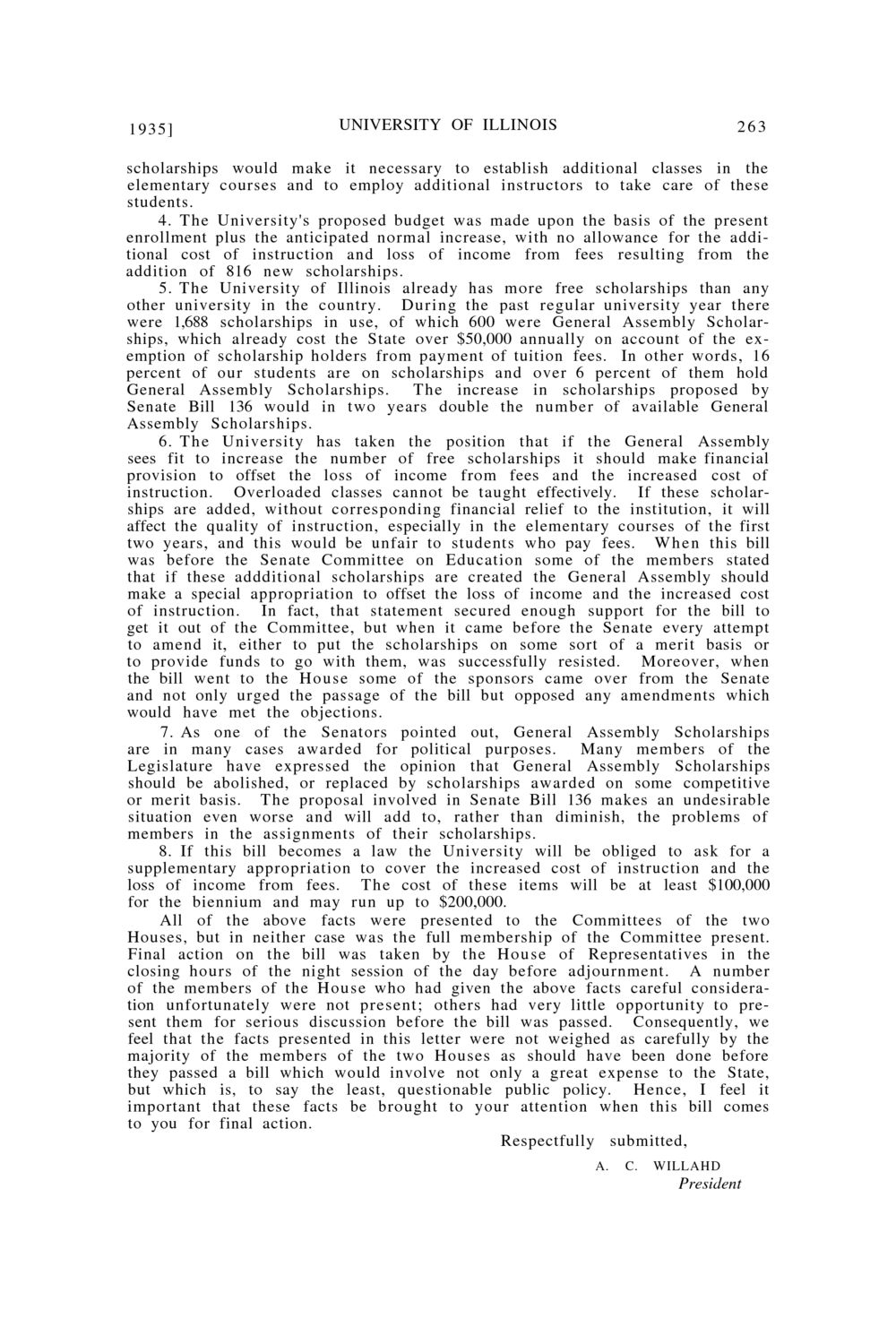| |
| |
Caption: Board of Trustees Minutes - 1936
This is a reduced-resolution page image for fast online browsing.

EXTRACTED TEXT FROM PAGE:
1935] UNIVERSITY OF ILLINOIS 263 scholarships would make it necessary to establish additional classes in the elementary courses and to employ additional instructors to take care of these students. 4. T h e University's proposed budget was made upon the basis of the present enrollment plus the anticipated normal increase, with no allowance for the additional cost of instruction and loss of income from fees resulting from the addition of 816 new scholarships. 5. T h e University of Illinois already has more free scholarships than any other university in the country. During the past regular university year there were 1,688 scholarships in use, of which 600 were General Assembly Scholarships, which already cost the State over $50,000 annually on account of the exemption of scholarship holders from payment of tuition fees. In other words, 16 percent of our students are on scholarships and over 6 percent of them hold General Assembly Scholarships. T h e increase in scholarships proposed by Senate Bill 136 would in two years double the number of available General Assembly Scholarships. 6. T h e University has taken the position that if the General Assembly sees fit to increase the number of free scholarships it should make financial provision to offset the loss of income from fees and the increased cost of instruction. Overloaded classes cannot be taught effectively. If these scholarships are added, without corresponding financial relief to the institution, it will affect the quality of instruction, especially in the elementary courses of the first two years, and this would be unfair to students who pay fees. W h e n this bill was before the Senate Committee on Education some of the members stated that if these addditional scholarships are created the General Assembly should make a special appropriation to offset the loss of income and the increased cost of instruction. In fact, that statement secured enough support for the bill to get it out of the Committee, but when it came before the Senate every attempt to amend it, either to put the scholarships on some sort of a merit basis or to provide funds to go with them, was successfully resisted. Moreover, when the bill went to the House some of the sponsors came over from the Senate and not only urged the passage of the bill but opposed any amendments which would have met the objections. 7. As one of the Senators pointed out, General Assembly Scholarships are in many cases awarded for political purposes. Many members of the Legislature have expressed the opinion that General Assembly Scholarships should be abolished, or replaced by scholarships awarded on some competitive or merit basis. T h e proposal involved in Senate Bill 136 makes an undesirable situation even worse and will add to, rather than diminish, the problems of members in the assignments of their scholarships. 8. If this bill becomes a law the University will be obliged to ask for a supplementary appropriation to cover the increased cost of instruction and the loss of income from fees. T h e cost of these items will be at least $100,000 for the biennium and may run up to $200,000. All of the above facts were presented to the Committees of the two Houses, but in neither case was the full membership of the Committee present. Final action on the bill was taken by the House of Representatives in the closing hours of the night session of the day before adjournment. A number of the members of the House who had given the above facts careful consideration unfortunately were not present; others had very little opportunity to present them for serious discussion before the bill was passed. Consequently, we feel that the facts presented in this letter were not weighed as carefully by the majority of the members of the two Houses as should have been done before they passed a bill which would involve not only a great expense to the State, but which is, to say the least, questionable public policy. Hence, I feel it important that these facts be brought to your attention when this bill comes to you for final action. Respectfully submitted, A. C. WILLAHD President
| |